Stories like a bond between us
In September 2010, immediately before the Reckless world-premiere Cornelia was extremely busy. However she enjoyed replying to Michael’s curious questions.
Michael: Hi Cornelia. Today is the worldpremiere of your new book: Reckless. How are you? Very nervous?
Cornelia: Normally it is not that bad, but this time I have to admit that I am really very, very nervous. And excited. It is a little different with this one compared to previus launches of my books: so many countries, so many children listening and watching in so many places. Reckless is a whole new world tasting so different than the stories I have written before. It is the first story I am telling together with someone else. It is the first book for which I will be wearing a special dress on stage! Yes, I really am very excited.
Michael: You have been working on the story for quite a while. Which are the passages you like most? For isn´t it as with reading: There are parts of the story one prefers and others one does not like so much?
Cornelia: Yes, indeed. I think one of my favourite chapters is the one where Will listens to the stones whispering to him. But I like the chapter with Chanute as well or the scenes taking place in the house of the witch. You see, it is not easy for me to pick one favourite passage.
Michael: Is it true that sometimes you especially like the passages which while writing troubled you the most? Which passage of Reckless would that be, which is the one you really racked your brain over?
Cornelia: True as well. For sometimes you work very hard on chapters that give you much of a headache. With Reckless the beginning of the story was a head-scratcher for me and Lionel Wigram. How much would we reveal right away? Should we begin with Jacob the child or should we begin with him grown up? How much do we give away and how many secrets should the world behind the mirror keep? And so on and so on and so on. I wrote a whole lot of versions, but now I really do appreciate the beginning of the story.
Michael: Is there something as well that you do not like so much? For example, are there certain stubborn characters unwilling to do what you wanted them to do? Do some things happen that you had expected to happen in a completely different way? And are there some details you haven´t carried off?
Cornelia: No. I deleted anything I was not happy with. And my characters made it easy for me even if they sometimes were a little reluctant. But when I had managed to find out which way to take them through the story they mostly followed willingly.
The character we had to think about the most is Clara, for we did not want her to be just the typical female add on to our hero, the one you often see in movies, a mere accessory. Many fairytales were rewritten over the centuries so that female characters got more and more helpless and stupid. We certainly did not want that to happen.
Michael: Do you have a favourite fairy tale? Is there one you had when you were a child, and is it a different one today?
Cornelia: My favourite fairy tale is, I guess, the one with the two brothers who turn into swans and whose sister rescues them. But the one I cannot get rid of in my head is the story of the Goose Girl. She has to watch how her beloved horse Falada is being beheaded and they nail his head over the gate that she had to move the geese through every morning. As a child that left me sad without words.
Michael: Jacob, you say, loves fear. How is that? How come someone likes being anxious? Anxiety is to be feared, isn´t it?
Cornelia: I have learned from my son that you can indeed like the feeling anxiety brings. He does somersaults from the roof of my writing house or from the balcony. When I asked him: aren´t you afraid?, he replied: Of course I am. But that is why I am doing it! Maybe he likes the feeling you get when you face your fears and overcome them. He likes the thrill of it. It may be the same with Jacob, but I think he uses fear to cover some other feelings and emotions he is unable to handle or does not want to show.
Michael: On paper you deal with all your characters, with Jacob and Kami´en, with Chanute and the Tailor and Fox and Valiant, with Will and the Dark Fairy. But that´s on paper only. Whom of your character would you be afraid of, is there one you definitely would not want to encounter in real life? You say that there is something of you in all of your characters. But after all one also can be afraid of oneself, right?
Cornelia: Yes, that´s true. As for Reckless there is only one character I do not want to meet for sure and that is the Tailor. All the others are not merely good or bad. The Red Fairy I would not want to meet either. I do not really like her, that´s why.
Michael: When you were writing the Inkworld — Inkheart, Inkspell and Inkdeath — you had real-life people serving as a kind of character-blueprint for your imagination, for example the actor Brendan Fraser for Mo. Who did you make use of for Reckless, who are the persons who inspired or triggered your imagination?
Cornelia: For Reckless that process was not necessary. Only for the character of Clara I had a Scottish friend´s daughter on my mind sometimes. But I dyed her hair blonde, for there already was the Dark Fairy with her black hair. And of course I changed a lot more. Neither Lionel nor me have an idea which actors we would cast for a Reckless movie.
Michael: Do you like the Goyl?
Cornelia: Oh, yes I do. I do like them very much actually. That is maybe because I have a strong compassion for those being hunted and suppressed. If I were the Empress I suppose I would fight them as well. But I liked slipping into Kami´en´s skin and it was easier for me to feel with him than with the Empress and his other human adversaries.
Michael: Do you have an idea why the Dark Fairy might have brought her spell to the world behind the mirror? Humans turn into Goyl if a Goyl injures them in a fight. The skin will vanish and the stone will grow. This is the Fairy´s spell.
Cornelia: I am not sure. Maybe she thought this was the only way to create a Man-Goyl with a skin of Jade, the only Goyl in turn who could save her lover Kami´en. But maybe Hentzau is right with his guess: that she wanted to bestow sons on Kami´en.
Michael: Would you like to visit the world behind the mirror yourself? Would you even like to live there? And if so, who would you like to be: a Fairy or Fox or the Empress...?
Cornelia: For a while I might like it beyond the mirror. But only for a while, not forever. And I presume I would chose Fox for my identity.
Michael: Who read the fairytales to you when you were a child?
Cornelia: A scratched long-playing record. I remember listening to it often when I was lying in bed. My Grandmother used to tell us children stories, but those were stories she had made up herself. I have no memories whether my parents read to us. But I remember many walks to the library where I went together with my father. And I remember these mountain-high piles of books we brought back home. Two huge and marvellous books come to my mind as well. My parents gave them to me and I still own these two books on wild animals and the wonders of nature. Furthermore there were two fairytale-books with pictures of a Czech illustrator. I would be watching these pics for hours. But, yes, it must have been that scratched LP telling me the Grimm´s Fairy Tales.
Michael: And did it give you the creeps?
Cornelia: Oh yes! As a child you somehow have the idea of the World being a serious place and you learn quite quickly that it can also be very dangerous place. When I had to get up in the dark, for example, I jumped out of my bed so that whoever lay under it could not grab my legs.
Michael: While writing are you sometimes as scared as while reading, when at the same time you want to know and do not want to know how the story is going on?
Cornelia: It happens. But the feeling I have while writing is a different one. Because you are responsible for what will happen in the story. It is up to you. Therefore together with the jimjams arises the will to write a good and thrilling story and you start to weigh up what it is that would make that story a good one. On top of that you sometimes may have a bad conscience if you get your characters into trouble, distress them or break their heart. Jacob was quite annoyed with me for the latter.
Michael: When he, Jacob, has to fight the Tailor, do you know in advance who will win that fight?
Cornelia: In this case I knew, because I did not want to lose my hero. By no means however do I know how he will manage to get through the whole story safe and sound, and when I start to write such scenes I am in his skin so deeply that I am not always sure if I will survive.
Michael: Below the title Reckless there is a line in the book saying: "A story found and told by Cornelia Funke and Lionel Wigram". Who is Lionel Wigram, and how does one find and tell a story together? How did you two do it?
Cornelia: Lionel normally works as a movie producer. He has done Harry Potter and currently is working on his second Sherlock Holmes movie. When we first met Lionel came up with an idea that he wanted to further develop and play out together. While writing a movie script we realized that we are amazingly good at creating stories together — we discovered the idea of a world which later became the one beyond the mirror. When I decided to explore this world for a book I asked Lionel if he would like to join in. 'Definitely!', he said. 'If you are comfortable with it.' So we decided to give it a try and it turned out to be a great adventure. For months we would meet each and every day to fill our world with characters and landscapes. We laughed and argued about ideas, picked to pieces the ideas of the other just to create a new one together. It was great. Like thinking with two heads all of a sudden. At one point I began writing down what we had made up. I wrote in German and as Lionel is an Englishman my cousin Oliver came into play. He is the one who also had "tailored" the English dress for my Thief Lord, and he translated every version of the Reckless story into English (which had been four at least). Lionel and me met over and over again. We corrected, changed, ameliorated words and sentences until finally we reached what we both considered the best way to tell this story. For I believe that for any story there is one, and only one, particular way to tell it right or best — like with a way through a labyrinth. And only if you find that way your characters will finally smile at you contentedly.
Michael: You illustrated the novel yourself — at least the German edition. How did you proceed? Did you pick up the pencil only after having written the story or did you begin drawing real or mental pictures of characters and scenes before. Because you like to get inspired by pictures you put on the walls of your writing house, right?
Cornelia: Yes, some of the pictures which inspired my illustrations surrounded me in my writing house while I was writing Reckless. Others only took shape after writing when I sat down to draw. Working on the illustrations took three months. I was listening to four audiobooks by Neil Gaiman and had a brillant time.
Michael: How come the German edition of the story has an English title as well?
Cornelia: Originally I wanted "Verwegen" to be the German title, for that is the German word for Reckless. But as the surname of my heroes is Reckless, which also sounds nice, all the publishers decided to stick to the English title — except the Russians. I am not fully content with this decision. In Spanish, for example, we would have had the title "Temerario" and I like the flavour of it. Usually, however, I leave those decisions to my publishers.
Michael: Why is Fox a fox?
Cornelia: I wanted Jacob to have a companion, someone waiting for him with the horses when he would come out of the tower. "I think I will choose a dwarf", I said to Lionel, "and just make him a little nicer." And Lionel was like: "No! Not a dwarf! He is mean. Come up with something or someone else!" I told him that I just liked the idea of a true friend for my hero, a true friend like a dog would be. "Well then, why don´t you take a dog?", Lionel said. "Make it a talking dog, ok, but a dwarf is not ok." And suddenly I knew who would be waiting for Jacob. For all these foxes in the Grimm´s Fairy Tales came to my mind. All of a sudden they appear in the woods and join the hero and help him and have good advice for him. Finally I also felt sure about Fox being a girl. Then my Japanese publisher told me that in Japan the fox is a symbol for the female. Which again shows that there are symbols and stories like a bond between us all. You just have to listen carefully, and they will whisper to you.
Michael: How did you come up with the idea of the moths flying from the Dark Fairy´s hair? Did you have it in your head like a picture or did someone tell you something inspiring?
Cornelia: Well, without knowing where it came from I just had that vision. And for quite a long time I have had the wish to include moths in a story, for I really like them for their beauty. I think they are fascinating creatures.
Michael: Was it a journey to another world for you as well to delve into fairytales again? A journey maybe back in time to the world of your childhood?
Cornelia: Absolutely. It was the biggest surprise of all because you never know what you are going to find behind the mirror. We do not have such a deep and detailed an awareness ourselves.
Interview: Michael Orth

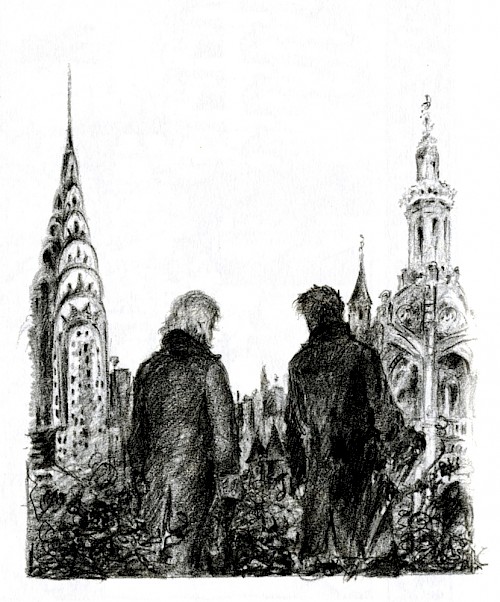
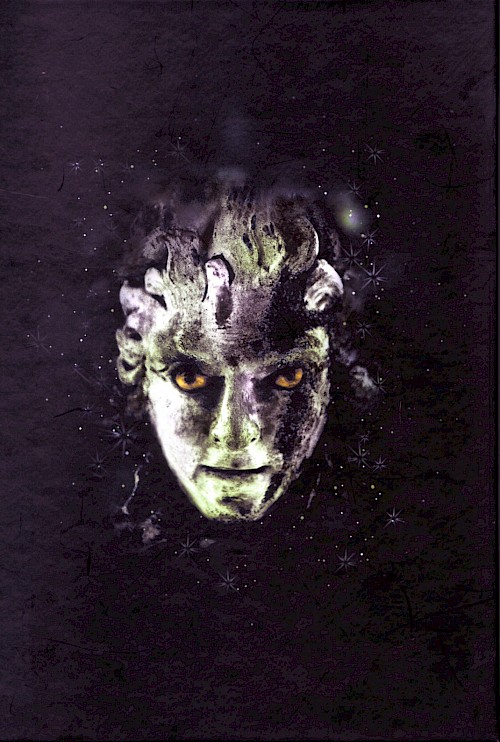
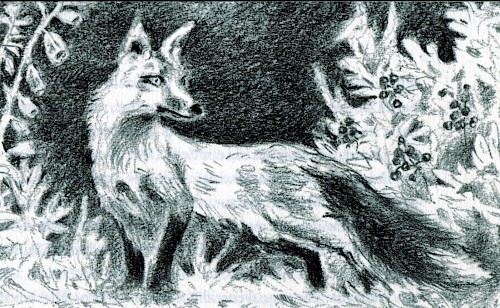
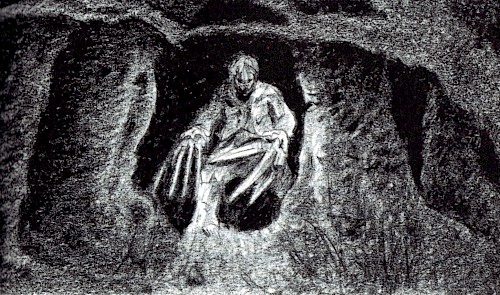
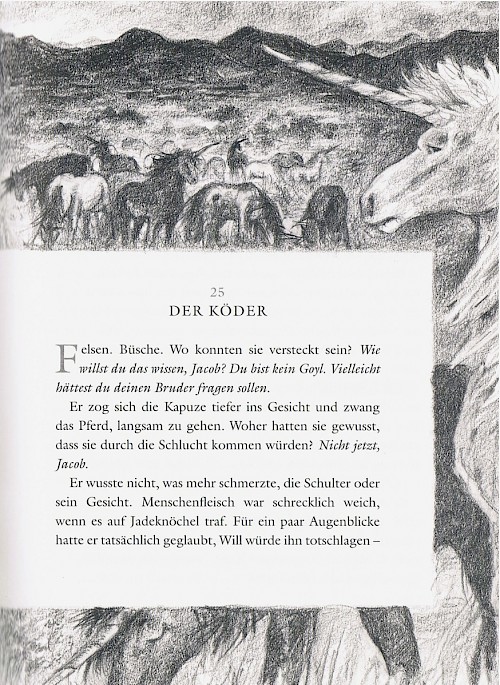
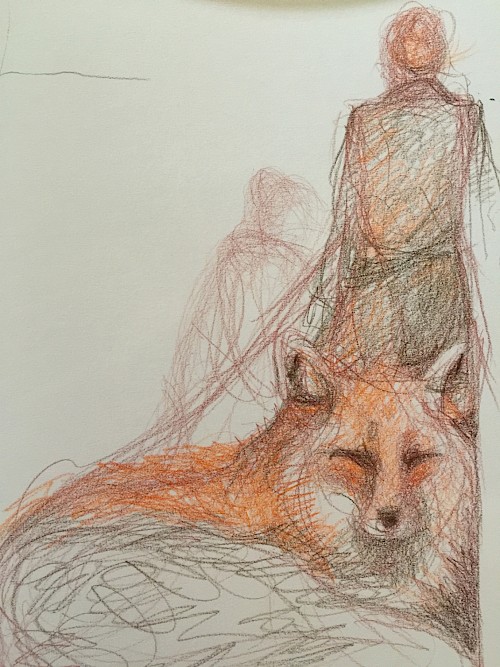
No comments
Leave a comment